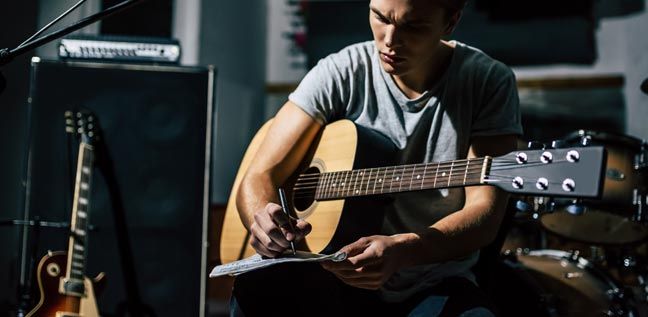Details Included in Exclusive Song Agreements
Salary:
Songwriters need to determine what amount of pay they need during the contracted time and how they want to receive their income. Possible negotiations can include the frequency of payments, the potential for bonuses for songs completed before deadlines, and the size of the royalty the songwriter will earn for their work.
Most exclusive song agreements pay the writer quarterly. The contract includes a set amount of pay divided into equal payments throughout the contracted time. The amount of income earned usually depends on the past success of the writer. Songwriters with a proven history of producing hits will typically make more than someone new to the industry.
Songwriters should remember that the money earned during their contract is an advance on their royalties. The publisher will remove the advance payments from future royalties. A favorable royalty percentage helps the writer to have more money left after the deduction.
Time:
Songwriters who have never worked under a contract before may want to choose an earlier end date than another writer that has experience with exclusive song agreements. A shorter contract period enables the less-experienced writer to see how they work under pressure. Not every artist wants someone else to have the rights to their work.
An Exclusive Song Agreement Law Firm can review the proposed contract with the songwriter to determine its pros and cons. The goals of each artist vary, so songwriters need reassurance the agreement will meet their needs.
Who Maintains the Song Rights?
Under an exclusive song agreement, the rights of the song belong to the publisher. Any work written by the artist during that contracted time belongs to the publisher. The songwriter can insist they get credit for creating work, so it remains in their portfolio and can aid them in future negotiations. Most exclusive song agreements do not give the songwriter any control over how publishers use the work produced during the contract. The publisher owns the songs and may use them for whatever they would like.
Songwriters should refrain from keeping work created during their contract for future use. Publishing work or selling it to others immediately after leaving an agreement could cause legal issues. Publishers may believe (or know) the work was written during their contract and could have a legal right to the song.
How Can Artists Retract Exclusive Song Agreements?
An Exclusive Song Agreement Attorney can help a songwriter to recoup losses from contracts that a publisher broke or did not follow as directed. Previously signed poorly written contracts may offer loopholes that allow the songwriter to leave the agreement. A songwriter is unlikely to succeed at taking back the rights to any songs written under a professionally prepared and signed contract.
Songwriters who feel uncomfortable about assigning all their rights to one publisher for everything written over one or two years may want to consider another agreement type. An Individual Song Agreement can enable writers and publishers to have a less exclusive arrangement. Songwriters can give publishers the rights to a song or a list of songs and work on their own or with other publishers in the same manner at the same time.
Individual Song Agreements may not include an advance, or the publisher may offer a smaller fixed payment for the song instead of future royalties. Prolific writers may prefer an arrangement like this over an Exclusive Song Agreement because they can have more control over each piece they create. Songwriters with a history of exceptional work already making money for them may appreciate the convenience of working with one publisher and avoiding the effort of self-promotion and shopping around for a buyer.






